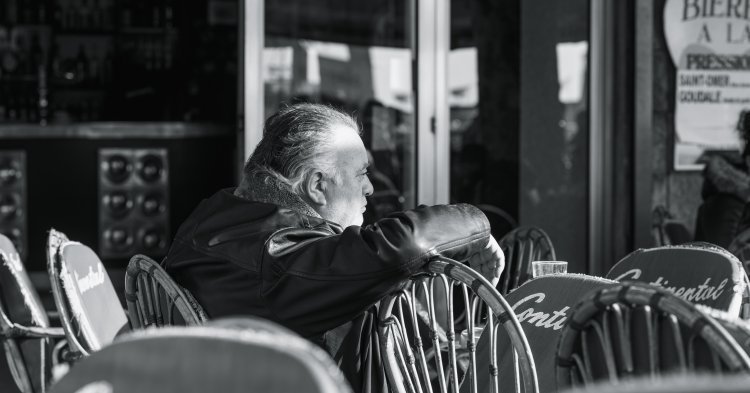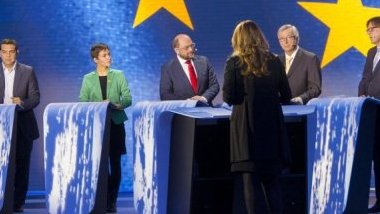Warning: if you intend to continue reading this article, we advise you to take any sharp object or firearm away, and to make sure you have antidepressants close by, because… well, you never know. I assume no liability in case of accidents.
So, the fifth episode of the broadcast “Into the Lion’s Den”, soberly titled “The European Union, towards chaos?”, displays a presenter promising us a real debate where attentiveness reigns, and with no waffle or indulgent questions. It carries on with the “experts” Daniel Shapira, writer for “Informations ouvrières” (“Information for Workers”), and Coralie Delaume, a journalist. These two notorious Europhobes both show their will to destroy the European Union. Add to this the nationalist comments of Jacques Cotta, all this is not really commendable. However, this reason of form is far from being the only one to accuse this programme of bad faith.
On the one hand, a journalist is not bound to neutrality, assuming that such an obligation is even possible to respect. The most important is transparency, knowing what we are talking about, and the absence of conflicts of interest. On the other hand, this interview is followed by a little more contradictory discussion gathering the conspiracy theorist François Asselineau [3], the candidate at the European elections for ‘La France Insoumise’ [4] Charlotte Girard, the pseudo-economist Jacques Nikonoff, and a MP from the Union of Democrats and Independents (UDI) Pierre-Yves Bournazel. The latter, who is the only one who truly supports the European project, was able to express himself as he pleased, and the exchange of views took place quite well. We could even regret the relative “indulgence of the questions”, despite the earlier promises. Actually, the only speaker to be put in a difficult position was the representative of ‘La France Insoumise’, as the presenter acted as if he was trying to force her to express herself as being for or against Europe (at least, here we’ll no longer accuse ‘The Media’ of working for Jean-Luc Mélenchon).
A debate that one wouldn’t dare to have outside of a bar
Indeed, all the tragedy of the controversy is here: it comes down to the question ‘for’ or ‘against’ the European Union, in an explosive mix of bad faith and bar talks. Let’s start with the interview with the “experts”. It is Jacques Cotta’s right to invite people opposed to the existence of the EU, and to avoid think tanks’ expertise or journalists working in Brussels. However, he could have avoided giving a microphone to people coming from nowhere, who did not work on the subject, and who string together one falsehood after another. Let’s reward Daniel Shapira for phrasing the only true sentence in a 40-minute interview: “Europe is governed by the states”. Reminding it was important, just in case we ended up thinking that the EU would be an ultraliberal centralised state where an imperial government called the European Commission would impose its directives to the oppressed peoples to the benefit of the banks. Besides, the debate between the invited politicians in the second part of the programme was of a less poor quality, especially thanks to Pierre-Yves Bournazel (it must be noted that with François Asselineau and Jacques Nikonoff, having a good quality conversation is quite a feat, if not a vain wish).
It is strictly impossible to note all the countless enormities that were declared, but one clearly has the impression of hearing the report of a three-month bar talk. The presenter’s conclusion pretty well sums up the content: “The European Union is not Europe. Europe is made of nations, peoples, aspirations, histories. The European Union is a political and economic construction, a construction aiming at weighing interests, especially financial interests, against the peoples’ interests, especially social and democratic interests”. More than one hour and a half of debates to get there, that takes some doing, and ‘The Media’ did it.
For reasons of public hygiene, a few remarks are necessary regarding the absurdities shouted out by Jacques Cotta (showing, by the way, his boorish ignorance of the European Union and of its history). He pretends that what the EU achieved could have been reached through simple international cooperation, and that before the Union, the states cooperated freely and with sovereign rights. One could not state a dumber remark, yet God only knows how many were made during this programme. So no, before European unification, the states did not cooperate, they were at war. Our continent has virtually known nothing but war until 1945. Even the nations were created through armed struggles. Italian unity was made through military means, as well as German unity, to take only the most recent examples. Outside of Europe, same observation: the United States of America, one of the biggest democracies in the world, was built upon two conflicts against England, a near-war against the France of Bonaparte, a Civil War, a war against Spain, slaughters of indigenous peoples, and racial segregation.
The European Union is actually the only human creation to be built without shedding one single drop of blood. Without being bigoted or blissfully ignorant, it is legitimate to talk about a miracle. As such, making the nation an unsurpassable horizon for Europe amounts to sentencing the continent to perpetual war [5]. I am not sure this would be in the peoples’ interest, but I surely must surely belong to a multicultural and disconnected elite. Moreover, if the Union’s achievements can be reached by simple diplomatic alliances, one should wonder where the equivalents of Ariane are in Southeast Asia, of Airbus in South America, or of Erasmus in Southern Africa.
Europe and the general media vacuum
However, it is worth noting that since the end of last year, the subjects dedicated to Europe or European elections have regularly appeared on television channels where, usually, they were considerably lacking. Unfortunately, not only do they rarely avoid stereotyped shortcuts ( the European Commission randomly imposed glyphosate) but they also content themselves with dissecting the political parties’ national strategies without unveiling neither the European Parliament’s powers nor the importance of voting.
The written press also knows its masterpieces of deep imbecility: special mention goes out to Michel Onfray for the interview he gave to L’Express in May about his book ‘Zéro de conduite’ (‘Black Mark’). Here, he tells that France has died since the Maastricht Treaty, in which the country would have given up its sovereignty in favour of a “liberal supranationality managed by a very much autocratic apparatus running the money, and so the media, and so the opinion”. He calls this the “Maastricht state”, that would forcefully impose impoverishment, lack of culture, deregulation and terrorism, for the benefit of the market, money and neocolonial wars. One has to wonder why no one pointed out to him that, all in all, he very frequently expresses himself in these media owned by the Maastricht state and the financial powers. But it would be out of question for me to comment on the interview or to read the book. I wouldn’t dare tackle the most famous bar fly, renowned for having read in one night (drunken night, otherwise it doesn’t count) the comprehensive works of Jean Giono and to recite by heart in his sleep entire passages of Orwell; I have given enough.
In short, the broadcasts of ‘The Media’ as well as Michel Onfray’s articles are nothing more than the caricature of the “media system” whose mediocrity they denounce all the time.



Follow the comments: |
|
